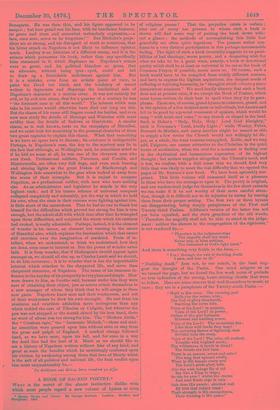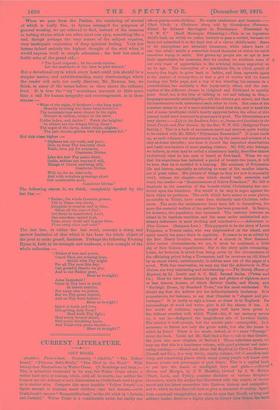A BOOK OF SACRED POETRY.*
WHAT is the secret of the almost instinctive dislike with which most people regard a new volume of hymns or even
• firnsu, Verses, and Chants. By George Rawson. London: Hodder and Stoughton. 1876.
of religious poems? That the prejudice exists is certain; nine out of every ten persons to whom such a book is shown will find some way of putting the book down with- out a glance ; the methods of accomplishing this little feat gracefully are often quite ingenious. The present writer con- fesses to a very distinct participation in this perhaps unreasonable feeling. The sight of such a book invariably suggests to.us possi- bilities of bad theology, worse poetry, and a despairing wish for what we take to be a great want, namely, a book of devotional poetry which shall be at least as universal in its use as the book of Common Prayer, if possible, much more so. Of course, such a book would have to be compiled from widely different sources,
and have to express the highest aspirations, the deepest needs of suffering or rejoicing humanity, in "thoughts which voluntary move harmonious numbers." We need hardly observe that such a book does not at present exist, if we except the Book of Psalms, which most hymn-writers do their best to spoil when they try to para- phrase. There are, of course, rand hymns in existence, grand, not 'in the opinion of a few isolated sects or individuals, but known and felt to be good by a general consensus of opinion, which would be
sung "with heart and voice" in any church or chapel in the land. Such is Heber's "Holy, Holy, Holy ! Lord God Almighty," such is Newman's "Lead, kindly Light ;" while Wesley, Faber, Bernard de Morlaix, and many another might be named as able to supply a few verses the Church would not willingly let die ;
yet, as a whole, the want remains unsupplied. Keble, and we may add, Palgrave, are names attractive to the Christian in the quiet hours of meditation, when the soul for a moment is finding rest in the rhythmical and harmonious expression of its highest thought ; but neither supplies altogether the Church's need, and it was, we confess, with a dull sense that we should find very little that was likely to meet the real difficulty that we opened the pages of Mr. Rawson's new book. We have been agreeably sur- prised. This little volume will commend itself as a pleasure to those who have the courage to open it. The poetry is original, and our readers shall judge for themselves in the few short extracts we can make if it be not worthy of their, more careful atten- tion, though it is difficult not to do injustice to verses by tearing them from their proper setting. The first two or three hymns are disappointing, being simply paraphrases of the First and Twenty-third Psalms. Addison's version of the latter has not yet been equalled, and the stern grandeur of the old words, "Therefore the ungodly shall not be able to stand in the judge- ment: neither the sinners in the congregation of the righteous," is not rendered by,— " Therefore in the judgment-time
The ungodly shall not stand ; Never join, in bliss sublime, The redeemed at God's right hand."
And there is something very feeble in the lines,— " Yea! through the vale of darkling death I pass, and fear no ill."
"Darkling death" does not, to our minds, in the least sug- gest the thought of the Psalm. Our mind misgave us as we turned the page, but we found the few weak notes of prelude no true indication of the strong, heart-stirring chords that were to follow. Here are some stanzas that wed themselves to music at once ; they are in a paraphrase of the Twenty-ninth Psalm
Hark to His voice. The crashing peal Rolls o'er the waters wide ; The God of glory thundereth, Startling the ocean tide.
Voice of the Lord! in majesty, Voice of the Lord! in power ; Cedars of sky-girt Lebanon Shivered and hurtling cower.
Voice of the Lord The mountains floe: Like their wild herds they leap!
The quivering flames of lightning rash Divided from the steep.
Voice of the Lord! The oaks, all scathed, Tremble with frighted scare ; The wilderness, it howls in dread!
The forests are laid bare.
There is an answer, sweet and calm!
The song that upward swells, When in His temple every soul The Lord's great glory tells.
O'er the wide deluge He of old
Sat like a King to reign;
So sits for ever! whilst the storms And mad floods rage in vain.
Safe then His people : shielded well
By love that cannot cease :
Their strength is His omnipotence, Their blessing is His peace."
When we pass from the Psalms, the rendering of several of which is really fine, to hymns arranged for •pmposes of general worship, we are relieved to find, instead of the sermons in halting rhyme which too often meet our eyes, something like a real, though perhaps the very nature of the subject requires, very inadequate expression of deep spiritual feeling. Very few hymns indeed embody the highest thought of the soul when it would express itself in simple adoration ; the best but catch a feeble echo of the grand old,-
" The Lord reigneth ; let the earth rejoice ;
Let the multitude of the isles be glad thereof."
But a devotional cry in which every heart could join should be a simpler matter, and notwithstanding many shortcomings, which the reader will only too easily discover, Mr. Rawson has, we think, in many of the verses before us risen above the ordinary level. It is true the " cry " sometimes amounts to little more than a call for human sympathy and encouragement, as in these stanzas :—
" What of the night, 0 brothers !—the long night
Heavily brooding o'er these vales helm ?- The mountain-tops seem dearer to the sight, Sharper in outline, crisper in the snow.
Colder below, and darker ! Watch the heights In silence are the fringes lifting there !
The angel of the dawn, midst clouds, alights; The pale streaks glisten with his presence fair."
But this rises higher :-
' Orphans are our souls, and poor ; Give us from Thy heavenly store Faith, love, joy for evermore,
Comforter Divine. Like the dew Thy peace distil, Guide, subdue our wayward will, Things of Christ unfolding still, Comforter Divine.
With us, for us, intercede, And with voiceless groanings plead Our unutterable need, Comforter Divine."
The following stanza is, we think, completely spoiled by the last line :—
a Father' the whole Creation groans, Till in Thine own abode
Complete in number and in bliss, Shine all the sons of God ; Let them be manifested, Lord, One countless, sacred host, From every world and bygone time, From every clime and coast."
The last line, or rather the last word, conveys a sharp and narrow limitation of that which it has been the whole object of the poet to make grand, limitless. Perhaps the following Evening Hymn is, both in its strength and weakness, a fair example of the whole collection :—
" Father of love and power,
Guard Thou our evening hour, Shield with Thy might, For all Thy care this day, Our grateful thanks we pay, And to our Father pray, Bless us to-night!
Jesus Immanuel !
Come in Thy love to dwell In hearts contrite.
For many sins we grieve, But we Thy grace receive, And on Thy word believe : Bless us to-night !
Spirit of truth and love, Life-giving, holy Dove!
Shed forth Thy light ; Heal every inward smart, Still every throbbing heart,
And Thine own peace impart,—
Bless us to•night !"



































 Previous page
Previous page